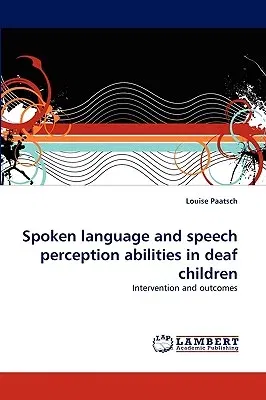Louise Paatsch
(Author)Spoken language and speech perception abilities in deaf childrenPaperback, 8 June 2010

Qty
1
Turbo
Ships in 2 - 3 days
In Stock
Free Delivery
Cash on Delivery
15 Days
Free Returns
Secure Checkout
Print Length
212 pages
Language
English
Publisher
LAP Lambert Academic Publishing
Date Published
8 Jun 2010
ISBN-10
3838373022
ISBN-13
9783838373027
Description
Product Details
Author:
Book Format:
Paperback
Country of Origin:
US
Date Published:
8 June 2010
Dimensions:
22.86 x
15.24 x
1.22 cm
ISBN-10:
3838373022
ISBN-13:
9783838373027
Language:
English
Location:
Saarbrucken
Pages:
212
Publisher:
Weight:
317.51 gm

